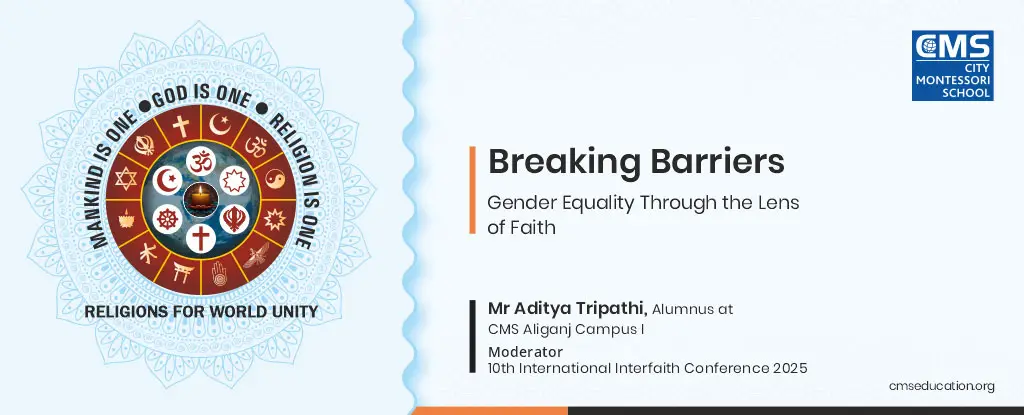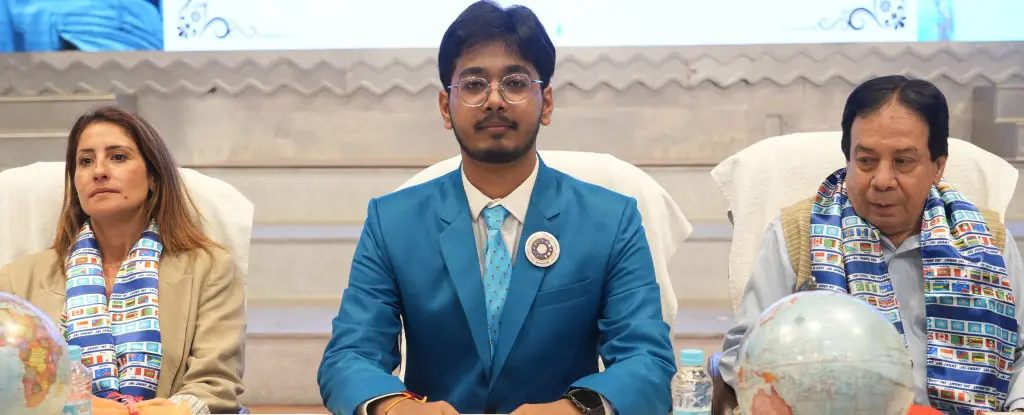
I believe every boy and girl should have the same respect, opportunities and rights. Religion, if understood in the right way, can help make this possible. Every faith teaches values like kindness, fairness and respect. These values do not belong to one gender. They are for everyone. If children are taught from an early age that every person is equal in the eyes of God, then they will grow up treating each other with the same respect.
This year, I, Aditya Tripathi, got the chance to be a moderator at the 10th International Interfaith Conference, which was hosted by CMS Rajajipuram Campus II. It was a three-day event based on the theme, “Together in Faith to Shape a Better World”. People from different countries and different religions came together to participate in the conference, including monks, priests, rabbis, imams and teachers. They all observe different traditions, but preach the same message of hope. The audience, filled with excitement, consists of students and learners from all over Lucknow.
My topic for discussion at the Interfaith Conference was “How Religious Teachings Inspire Young Minds to Treat Girls and Boys Equally in Thoughts and Actions”. While speaking on this topic, I realised that equality is not only a modern idea. It is something that religions have always supported. Buddhism teaches compassion. Islam teaches justice. Hinduism teaches respect. Christianity teaches love.
All these messages point to the same thing. Every human being is worthy of dignity, no matter whether they are a boy or a girl. If we learn this early in life, it becomes a habit and a part of who we are. The panellists for my session spoke beautifully on how in tough times, men and women, irrespective of their caste, creed or gender, have come together to face the challenges of the modern era.
Being the moderator for Panel Session Round 3 was a big responsibility for me. I was a little nervous at first, but once the discussion started, I became completely involved in it. The panel was attended by respected guests like Dr Sally Hammond (Consultant, Communication & Digital Media Specialist, Lebanon) and Prof. Geeta Gandhi Kingdon (Manager, CMS), along with other experts. Each one of them brought a new perspective and shared experiences that connected deeply to our theme.
One moment that stayed with me was when respected Dr Sally Hammond spoke about the post-World War era, when women stepped forward to earn for their families and take leadership roles. She explained how those times proved that women have the same strength and determination as men when given the chance. It made me think about how history itself is full of examples where women have broken barriers, even in the hardest of times.
Respected Prof. Geeta Gandhi Kingdon also gave an important message. She said that schools are the best place to practice equality, and it is not just about equality as a word but about truly understanding that boys and girls have equal potential and capacities. I felt this aligned perfectly with my topic and also with the idea of peace education at CMS. If we can teach equality in classrooms, it will grow naturally into the society outside.
There were also moments where the panellists spoke about things that went beyond gender. One of them quoted the example of organ donations. Their message included that in critical situations like these, we never consider the gender or religion of the person. In times of need, we simply see each other as human beings. That thought touched me because it was an example of the purest form of interfaith harmony. It shows that in real life, kindness and humanity are all that matter.
As the session went on, I realised that this conference was not only about conversations or exchange of dialogue. It was also about building understanding among people of all backgrounds. We were practising interfaith harmony right there in the room. People from different beliefs were not just sharing their traditions but also listening to others with respect. This is what true education in schools is all about. It prepares us to accept differences without fear and to work together for something that matters more than our interests.
For me, these three days were also a lesson in listening. I learned that sometimes the most powerful thing you can do is listen to someone else’s story without judging it. I met people whose lives were completely different from mine, yet we still found common ground. It made me realise that respect grows when we try to understand, not when we try to prove we are right. I also understood that my voice matters, and so does the voice of every young person. When we speak with honesty and listen with an open mind, real change can begin.
I walked out of the conference hall with a clear thought in my mind. Change will not come if we sit and wait for someone else to bring it. It has to start with us, in our schools, in our homes and in the way we treat the people around us. I am no longer just a student who attended an event. I am someone who has a sense of responsibility now.
If faith can bring people together for three days, then I believe that courage and kindness can keep them together for a lifetime. And I think I will live with this idea for my lifetime as an enlightened alumnus of City Montessori School.

Moderator, 10th International Interfaith Conference